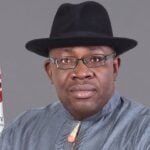President Bola Tinubu launched the Organization of African First Ladies for Development (OAFLAD) in Nigeria on Monday with the theme “We Are Equal..”
Speaking during the event at State House Conference Hall, Abuja, he expressed his commitment to continue working towards ending gender-based violence and increasing learning opportunities for girls in safe and conducive environments.
President Tinubu stressed the imperative of education in empowering girls and promoting gender equality.
He commended the OAFLAD initiative for launching the campaign, noting that it has been successfully launched in 15 other African countries.
The president added that the launch’s focus on Nigeria with the title “Education as a Powerful Tool for Change,” is critical for Africa’s development.
The president stated: “We must continue to create opportunities for all our children to access quality education without leaving anyone behind, particularly the girl child.
“We must engender a society where everyone has the same opportunities, regardless of who they are, because doing that leads to a stronger and more peaceful society for all.”
The president also praised the African First Ladies for their commitment to advancing gender equality and narrowing the gender gap in opportunities and appointments across Africa.
“I salute the commitment and dedication of the African First Ladies, as members of OAFLAD, to advance gender equality and narrow the gender gap in opportunities and appointments across the African continent,” he said.
Speaking to his wife, the First Lady of Nigeria, Oluremi, the president commended her efforts in championing education as a primary tool to advance gender equality, saying: “I particularly congratulate my dear wife, Senator Oluremi Tinubu, the First Lady of Nigeria, who has chosen education as a primary tool to champion this campaign nationwide.”
Tinubu noted that the launch of the #WeAreEqual Campaign in Nigeria, with a focus on education as a tool for change is critical for Africa’s development.
“The focus of the launch of this campaign in Nigeria, ‘Education as a Powerful Tool for Change’, is critical for Africa’s development if we are to attain gender equity and ensure equal opportunities for all,” he noted.
President Tinubu stressed the importance of laws and policies that protect and promote women’s rights, invest in girls’ education and skills development, and create economic opportunities accessible to all.
“We must work together to promote laws and policies that protect and promote women’s rights, invest in girls’ education and skills development, and create economic opportunities that are accessible to all,” he added.
President Tinubu further reaffirmed his commitment to ensuring that no Nigerian child is excluded from quality education that prepares women and girls to lead and bring positive changes to their communities.
“I reaffirm my commitment to ensuring that no Nigerian child is excluded from quality education that prepares women and girls to lead and bring positive changes to our communities,” he stated.
He called on all relevant stakeholders to carry the campaign forward to empower girls and promote gender equality.
“Let us carry forward this campaign, which promises to gift an educated girl-child the potential to bring the necessary change, and transform African communities for the better,” he added.
In her remarks, Nigeria’s First Lady, Oluremi Tinubu said education will continue to receive the needed attention from the government because it remains the bedrock for national development.
She noted that African First Ladies are focused on giving education to the girl child in order to bridge the gender gap through a year-long campaign.
The First Lady stated, “The #WeAreEqual campaign is a year-long, continent-wide initiative, led by OAFLAD. This significant campaign unites African First Ladies, partners, and allies in our collective effort to advance gender equity and bridge the gender gap throughout the continent.
“The Campaign is focused on four main pillars, namely: Health, Gender-Based Violence, Education and Economic Empowerment – to rally stakeholders and call for action around each of these key issues.”
“I believe that every state in Nigeria, and indeed Africa, should have schools where socio-economically disadvantaged girls and women can access education without fear or discrimination. We are not there yet, but gradually, I believe we can achieve this goal with the support of critical stakeholders in the education sector, particularly the Federal and State Ministries of Education,” she added.
ALSO READ THESE TOP STORIES FROM NIGERIAN TRIBUNE






